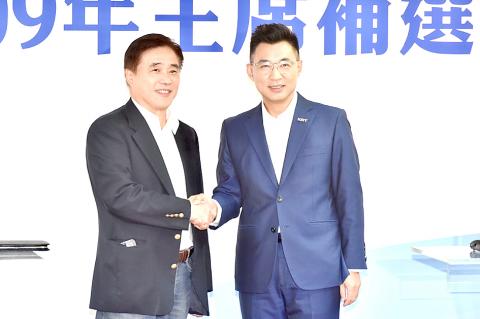Chinese Nationalist Party (KMT) Legislator Johnny Chiang (江啟臣) and former KMT vice chairman Hau Lung-bin (郝龍斌) yesterday presented their platforms as candidates in the party’s chairperson by-election to be held on March 7.
Speaking before the presentations began at KMT headquarters in Taipei, KMT Acting Chairman Lin Rong-te (林榮德) called the by-election “the most important step in the party’s push for reform.”
“No matter which of the two of us serves as the chairman of the KMT, we will face difficult reforms,” Chiang said. “The KMT has reached an important moment when reform cannot be avoided.”

Photo: Tu Chien-jung, Taipei Times
Chiang said the party’s defeats in the 2016 and this year’s elections showed that it needs to “redesign and adjust” aspects such as its core values, policies and its nomination process.
Among the proposals he has made are the creation of an 11-member decisionmaking group within the party that would “respond quickly to public opinion”; better use of online tools to communicate with the public; and a digitization of the services the party provides to its members.
Chiang also called for a series of discussions on the party’s values and policies, including its policy on cross-strait relations.
Meanwhile, Hau attributed the party’s losses in the Jan. 11 elections to “selfishness” and a “lack of unity.”
President Tsai Ing-wen (蔡英文) and former premier William Lai (賴清德) ran on the same ticket after competing in the Democratic Progressive Party’s (DPP) presidential primary, he said, adding: “This is an example we must learn from.”
“The KMT’s core philosophy is to defend the Republic of China [ROC] and oppose Taiwan’s independence,” Hau said, adding that he would follow that philosophy.
In his speech, Hau also addressed calls for older members of the KMT to hand over the party’s leadership to the younger generation, saying that a person’s attitude, ability and experience — rather than age — determine whether they are competent.
During the question-and-answer portion of the presentations, reporters asked Chiang whether he plans to run in the 2022 local elections or the 2024 national elections.
Chiang said that his focus at the moment is on serving the public in his capacity as a lawmaker and leading the KMT’s reform if he is elected next month.
If elected, his term as chairman would end on May 20 next year, he said, adding: “After 2021, I do not know whether I will have an opportunity to perform other duties.”

CHANGING LANDSCAPE: Many of the part-time programs for educators were no longer needed, as many teachers obtain a graduate degree before joining the workforce, experts said Taiwanese universities this year canceled 86 programs, Ministry of Education data showed, with educators attributing the closures to the nation’s low birthrate as well as shifting trends. Fifty-three of the shuttered programs were part-time postgraduate degree programs, about 62 percent of the total, the most in the past five years, the data showed. National Taiwan Normal University (NTNU) discontinued the most part-time master’s programs, at 16: chemistry, life science, earth science, physics, fine arts, music, special education, health promotion and health education, educational psychology and counseling, education, design, Chinese as a second language, library and information sciences, mechatronics engineering, history, physical education

The High Prosecutors’ Office yesterday withdrew an appeal against the acquittal of a former bank manager 22 years after his death, marking Taiwan’s first instance of prosecutors rendering posthumous justice to a wrongfully convicted defendant. Chu Ching-en (諸慶恩) — formerly a manager at the Taipei branch of BNP Paribas — was in 1999 accused by Weng Mao-chung (翁茂鍾), then-president of Chia Her Industrial Co, of forging a request for a fixed deposit of US$10 million by I-Hwa Industrial Co, a subsidiary of Chia Her, which was used as collateral. Chu was ruled not guilty in the first trial, but was found guilty

Taiwan-based publisher Li Yanhe (李延賀) has been sentenced to three years in prison, fined 50,000 yuan (US$6,890) in personal assets and deprived political rights for one year for “inciting secession” in China, China's Taiwan Affairs Office spokesman Chen Binhua (陳斌華) said today. The Shanghai First Intermediate People’s Court announced the verdict on Feb. 17, Chen said. The trial was conducted lawfully, and in an open and fair manner, he said, adding that the verdict has since come into legal effect. The defendant reportedly admitted guilt and would appeal within the statutory appeal period, he said, adding that the defendant and his family have

DEADLOCK: As the commission is unable to forum a quorum to review license renewal applications, the channel operators are not at fault and can air past their license date The National Communications Commission (NCC) yesterday said that the Public Television Service (PTS) and 36 other television and radio broadcasters could continue airing, despite the commission’s inability to meet a quorum to review their license renewal applications. The licenses of PTS and the other channels are set to expire between this month and June. The National Communications Commission Organization Act (國家通訊傳播委員會組織法) stipulates that the commission must meet the mandated quorum of four to hold a valid meeting. The seven-member commission currently has only three commissioners. “We have informed the channel operators of the progress we have made in reviewing their license renewal applications, and